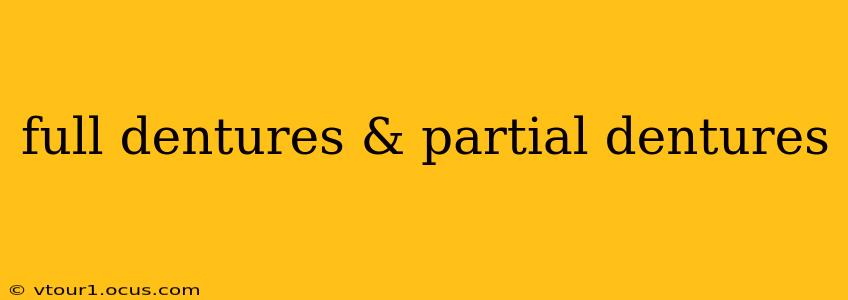Losing teeth can significantly impact your confidence, eating habits, and overall quality of life. Fortunately, advancements in dentistry offer excellent solutions like full and partial dentures. Understanding the differences between these two options is crucial in making an informed decision about your oral health. This comprehensive guide will explore the pros and cons of each, helping you determine which type of denture best suits your needs.
What are Full Dentures?
Full dentures, also known as complete dentures, are removable replacements for all the teeth in either your upper or lower jaw, or both. They're typically made from acrylic resin, a durable and relatively inexpensive material, although other materials like porcelain are available for a more natural look and feel. Full dentures are a common solution for individuals who have lost all their natural teeth due to periodontal disease, injury, or other reasons.
Advantages of Full Dentures:
- Improved Appearance: Full dentures can significantly improve your smile and facial aesthetics, restoring a youthful appearance.
- Improved Speech: Dentures help improve speech clarity by restoring the proper placement of the tongue and palate.
- Improved Chewing and Eating: While not as efficient as natural teeth, full dentures allow for a wider range of foods to be consumed compared to having no teeth.
- Cost-Effective Solution: Compared to other tooth replacement options like dental implants, full dentures are generally more affordable.
Disadvantages of Full Dentures:
- Initial Adjustment Period: Getting used to full dentures takes time and patience. Initially, you might experience discomfort, soreness, and difficulty speaking or eating.
- Relatively Poor Fit: Full dentures rely on suction and the natural contours of your gums for a secure fit. Over time, changes in your gum tissue can affect the fit and stability of the dentures.
- Regular Maintenance: Full dentures require regular cleaning and maintenance to prevent bacterial growth and maintain a good fit.
- Limited Functionality: Chewing and biting force are reduced compared to natural teeth, limiting the types of foods you can comfortably eat.
What are Partial Dentures?
Partial dentures are removable appliances that replace some, but not all, of your natural teeth. They're typically used when you still have some healthy teeth remaining that can anchor the denture. Partial dentures can be made from various materials, including acrylic resin, metal frameworks, and combinations of both. The design of a partial denture is tailored to fit your unique mouth structure.
Advantages of Partial Dentures:
- Preserve Remaining Teeth: Partial dentures help preserve the position and health of your remaining natural teeth.
- Better Fit and Stability: Because they utilize existing teeth for support, partial dentures often offer a better fit and stability than full dentures.
- Improved Chewing and Eating: Partial dentures generally offer better chewing efficiency than full dentures.
- Enhanced Speech: Partial dentures can improve speech clarity by filling in gaps left by missing teeth.
Disadvantages of Partial Dentures:
- More Expensive Than Full Dentures: Partial dentures typically cost more than full dentures due to their more complex design and materials.
- Potential for Gum Irritation: Like full dentures, partial dentures can cause gum irritation, especially if they don't fit properly.
- Requires More Maintenance: Partial dentures require regular cleaning and maintenance to prevent bacterial growth and maintain a good fit.
- Not Suitable for Severely Damaged Teeth: If you have extensive tooth damage or bone loss, partial dentures may not be an appropriate solution.
What are the Differences Between Full and Partial Dentures?
| Feature | Full Dentures | Partial Dentures |
|---|---|---|
| Teeth Replaced | All teeth in one or both arches | Some teeth in one or both arches |
| Support | Gums and suction | Gums and remaining natural teeth |
| Cost | Generally less expensive | Generally more expensive |
| Fit | Can become loose over time | Generally offers better stability |
| Maintenance | Requires regular cleaning and adjustments | Requires regular cleaning and adjustments |
| Suitability | For individuals with complete tooth loss | For individuals with some remaining teeth |
How Long Do Dentures Last?
The lifespan of dentures varies depending on several factors, including the materials used, your oral hygiene practices, and the overall health of your gums. With proper care, dentures can last for 5-10 years or even longer. Regular checkups with your dentist are crucial for ensuring a proper fit and addressing any issues that may arise.
Are Dentures Comfortable?
The comfort level of dentures varies from person to person. Many individuals experience an adjustment period initially, during which some discomfort is normal. Your dentist can make adjustments to improve the fit and alleviate any discomfort. Proper oral hygiene and regular dental checkups are key to ensuring long-term comfort and avoiding problems.
What are the Costs Associated with Dentures?
The cost of dentures depends on various factors, including the type of denture, the materials used, and your geographic location. It's best to consult with your dentist for an accurate estimate based on your specific needs. Remember that the costs may also include adjustments and ongoing maintenance.
Choosing between full and partial dentures is a personal decision. Consult your dentist to determine which option is best suited to your specific oral health needs and lifestyle. They can assess your condition and guide you towards the most effective and comfortable solution for restoring your smile and improving your overall well-being.
